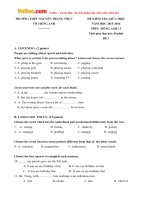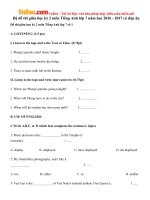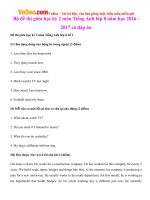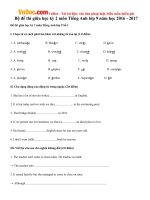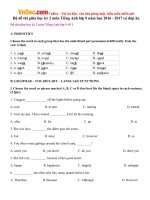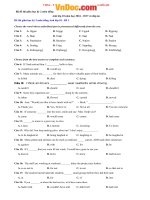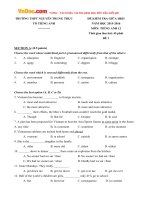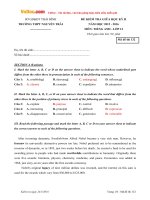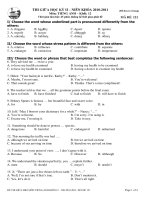Đề thi giữa học kỳ 2 môn Tiếng Anh lớp 12 Trường THPT Lương Ngọc Quyến năm 2020-2021 | Tiếng Anh, Lớp 12 - Ôn Luyện
Bạn đang xem bản rút gọn của tài liệu. Xem và tải ngay bản đầy đủ của tài liệu tại đây (131.95 KB, 5 trang )
TRƯỜNG THPT
LƯƠNG NGỌC QUYẾN
(Đề kiểm tra có 05 trang)
ĐỀ KIỂM TRA HỌC KỲ II – NĂM HỌC 2020-2021
Môn: TIẾNG ANH LỚP 12
Thời gian làm bài: 50 phút (không kể thời gian phát
đề)
Họ, tên thí sinh:..........................................................................
Mã đề: 001
Số báo danh ………………………..
Question 1: Mark the letter A, B, C, or D on your answer sheet to indicate the most suitable
response to complete the following exchange.
Peter and Mary are discussing about their afternoon plan.
Peter: “Would you like to go to the cinema with me this afternoon?” - Mary: “____________”
A. I’m sorry
B. Yes, I like
C. That’s a good idea
D. Thank you. It’s very kind of you to ask me
Question 2: Mark the letter A, B, C, or D on your answer sheet to indicate the word whose
underlined part differs from the other three in pronunciation in the following question.
A. laughed
B. moved
C. looked
D. stepped
Question 3: Mark the letter A, B, C, or D on your answer sheet to indicate the correct answer to
the following question.
He was put ______________prison.
A. from
B. at
C. into
D. to
Question 4: Mark the letter A, B, C, or D on your answer sheet to indicate the correct answer to
the following question.
Sandra hated _______ though she didn’t say a word.
A. being photographed
B. photographed
C. to being photographed
D. being photograph.
Question 5: Mark the letter A, B, C, or D on your answer sheet to indicate the correct answer to
the following question.
My lawyer had told me to____________ the contract before I signed it.
A. look back
B. look over
C. look up
D. look down
Question 6: Mark the letter A, B, C, or D on your answer sheet to indicate the sentence that is
closest in meaning to the following question
“Me? No, I didn’t tell lies to Suanna.”, Bob said.
A. Bob denied telling lies to Suanna.
B. Bob admitted not telling lies to Suanna.
C. Bob apologize for telling lies to Suanna.
D. Bob refused to tell lies to Suanna.
Question 7: Mark the letter A, B, C, or D on your answer sheet to indicate the sentence that best
combines each pair of sentences in the following question.
The soccer team knew they lost the match. They soon started to blame each other.
A. Not only did the soccer team lose the match but they blamed each other as well
B. No sooner had the soccer team started to blame each other than they knew they lost the match.
C. As soon as they blamed each other, the soccer team knew they lost the match.
D. Hardly had the soccer team known they lost the match when they started to blame each other.
Question 8: Mark the letter A, B, C, or D on your answer sheet to indicate the word whose
underlined part differs from the other three in pronunciation in the following question.
A. eradicate
B. enthusiastic
C. effort
D. effective
Question 9: Mark the letter A, B, C, or D on your answer sheet to indicate the correct answer to
the following question.
Major fouls are ________ by one minute in the penalty box.
A. penalized
B. prohibited
C. sentenced
D. forced
Question 10: Mark the letter A, B, C, or D on your answer sheet to indicate the correct answer to
the following question.
We ate some _______________________ apples
A. round English green
B. English round green
C. round green English
D. green round English
Question 11: Mark the letter A, B, C, or D on your answer sheet to indicate the correct answer to
the following question.
________ having the best qualifications among all the applicants, Justin was not offered the job.
A. Although
B. While
C. Despite of
D. In spite of
Question 12: Mark the letter A, B, C, or D on your answer sheet to indicate the underlined part
that needs correction in the following question.
The children are old enough to look after its pets when adults are not at home.
A
B
C
D
Question 13: Mark the letter A, B, C, or D on your answer sheet to indicate the correct answer to
the following question.
She was thoughtfully looking at him while he
a newspaper
A. read
B. was reading
C. has read
D. has been reading
Question 14: Mark the letter A, B, C, or D on your answer sheet to indicate the correct answer to
the following question.
I lost my keys but, ___________ my neighbour was able to find them.
A. unfortunate
B. fortunately
C. unfortunatetly
D. fortunate
Question 15: Mark the letter A, B, C, or D on your answer sheet to indicate the word(s) CLOSEST
in meaning to the underlined word(s) in the following question.
The boy was brought up with a family in the countryside.
A. grown
B. reared
C. bred
D. raised
Question 16: Mark the letter A, B, C, or D on your answer sheet to indicate the sentence that best
combines each pair of sentences in the following question.
The author deeply regrets inconvenience the error may have caused to readers of the journal.
A. The author regretted having caused inconvenience to readers of the journal.
B. The author wishes he hadn’t made any error to cause inconvenience to readers of the journal.
C. The author regrets not having caused inconvenience to readers of the journal.
D. Only if the author may not have caused to readers of the journal.
Question 17: Mark the letter A, B, C, or D on your answer sheet to indicate the correct answer to
the following question.
The narrower the road is, _____________
A. many accidents will happen on it.
B. the more accidents will take place on it.
C. the more will accidents happen on it.
D. the narrowest accidents will take place on it.
Question 18: Mark the letter A, B, C, or D on your answer sheet to indicate the word(s)
OPPOSITE in meaning to the underlined word(s) in the following question.
We have to work against the clock so as to meet the deadline of the clients tomorrow.
A. work as fast as possible
B. work in a haste
C. work slowly
D. work strenuously
Read the following passage and mark the letter A, B, C, or D on your answer sheet to indicate the
correct answer to each of the questions from 19 to 25.
Floods are second only to fire as the most common of all natural disasters. They occur almost
everywhere in the world, resulting in widespread damage and even death. Consequently, scientists
have long tried to perfect their ability to predict floods. So far, the best that scientists can do is to
recognize the potential for flooding in certain conditions. There are a number of conditions, from
deep snow on the ground to human error, that cause flooding.
When deep snow melts it creates a large amount of water. Although deep snow alone rarely causes
floods, when it occurs together with heavy rain and sudden warmer weather it can lead to serious
flooding. If there is a fast snow melt on top of frozen or very wet ground, flooding is more likely to
occur than when the ground is not frozen. Frozen ground or ground that is very wet and already
saturated with water cannot absorb the additional water created by the melting snow. Melting snow
also contributes to high water levels in rivers and streams. Whenever rivers are already at their full
capacity of water, heavy rains will result in the rivers overflowing and flooding the surrounding land.
Rivers that are covered in ice can also lead to flooding. When ice begins to melt, the surface of the
ice cracks and breaks into large pieces. These pieces of ice move and float down the river. They can
form a dam in the river, causing the water behind the dam to rise and flood the land upstream. If the
dam breaks suddenly, then the large amount of water held behind the dam can flood the areas
downstream too.
Broken ice dams are not the only dam problems that can cause flooding. When a large humanmade dam breaks or fails to hold the water collected behind it, the results can be devastating. Dams
contain such huge amounts of water behind them that when sudden breaks occur, the destructive
force of the water is like a great tidal wave. Unleashed dam waters can travel tens of kilometres,
cover the ground in metres of mud and debris, and drown and crush every thing and creature in their
path.
Although scientists cannot always predict exactly when floods will occur, they do know a great
deal about when floods are likely, or probably, going to occur. Deep snow, ice-covered rivers, and
weak dams are all strong conditions for potential flooding. Hopefully, this knowledge of why floods
happen can help us reduce the damage they cause.
(Adapted from " />Question 19: Which of the following is the main topic of the passage?
A. Broken ice dams
B. Deep snow melting
C. Causes of floods
D. Consequences of floods
Question 20: Which of the following are included as causes for floods in the reading passage?
A. droughts
B. large lakes
C. melting snow
D. poorly built roads
Question 21: Which of the following best describes how a frozen river can cause a flood?
A. The ice in the river cracks into pieces that eventually create a dam causing the water to
overflow.
B. The water behind the ice dam collects and when the dam breaks, it causes flooding upstream.
C. The ice in the river melts too quickly and causes a flood.
D. The ice in the river cracks causing the water to overflow.
Question 22: The word “They” in paragraph 3 refers to_________.
A. Pieces of ice
B. Streams
C. Heavy rains
D. Rivers
Question 23: What kinds of problems can floods cause?
A. widespread damage
B. destruction of plants and animals
C. downstream
D. death
Question 24: The word “unleashed” in paragraph 4 is closest in meaning to_________.
A. almost flooded
B. quite strong
C. perfect
D. let free
Question 25: It can be inferred from the passage that knowledge of when floods exactly
happen_________.
A. helps people improve conditions for potential flooding
B. is likely to be predicted correctly
C. can be easily seen by the scientists
D. is still a question for scientists
Read the following passage and mark the letter A, B, C, or D on your answer sheet to indicate the
correct word or phrase that best fits each of the numbered blanks from 26 to 30.
The Covid-19 corona virus outbreak is a new illness and scientists are still assessing how it
spreads (26)______ person to person, but similar viruses tend to spread via cough and sneeze
droplets. When an infected person coughs or sneezes, they release droplets of saliva or mucus. These
droplets can fall on people in the vicinity and can be either directly inhaled or picked up on the hands
then (27)________when someone touches their face, causing infection. For flu, some hospital
guidelines define exposure as being within six feet of an infected person (28)________ sneezes or
coughs for 10 minutes or longer. Viruses can also be spread through droplets landing on surfaces such
as seats on buses or trains or desks in school. (29)______, whether this is a main transmission route
depends on how long viruses survive on surfaces – this can vary from hours to months. There is
anecdotal evidence that the virus can be spread by people before they have symptoms. Some
(30)_______ illnesses such as flu can be passed from one person to another before symptoms occur –
but the extent to which this is happening with the new corona virus is not well understood yet.
(Adapted from: )
Question 26: A. between
B. from
C. for
D. with
Question 27: A. transformed B. emerged
C. transferred
D. exchanged
Question 28: A. which
B. when
C. where
D. who
Question 29: A. In fact
B. Therefore
C. Moreover
D. However
Question 30: A. another
B. other
C. every
D. one
Question 31: Mark the letter A, B, C, or D on your answer sheet to indicate the correct answer to
the following question.
I _________ you a letter if I had known your address.
A. would have sent
B. would send
C. will send
D. sent
Question 32: Mark the letter A, B, C, or D on your answer sheet to indicate the correct answer to
the following question.
They finished _______________and then they wanted _______________out for pleasure.
A. learn/ to go
B. to learn/ go
C. learnt/ goes
D. learning/ to go
Question 33: Mark the letter A, B, C, or D on your answer sheet to indicate the correct answer to
the following question.
Jimmy always takes the _______ by the horns at every chance in order to become a famous pop
star, which is why he is so successful now.
A. bull
B. cow
C. buffalo
D. horse
Question 34: Mark the letter A, B, C, or D on your answer sheet to indicate the sentence that is
closest in meaning to the following question
The last time I went to the museum was a year ago.
A. At last I went to the museum after a year
B. A year ago, I often went to the museum.
C. My going to the museum lasted a year.
D. I have not been to the museum for a year.
Question 35: Mark the letter A, B, C, or D on your answer sheet to indicate the word that differs
from the other three in the position of primary stress in the following question.
A. depletion
B. animal
C. confusion
D. convention
Question 36: Mark the letter A, B, C, or D on your answer sheet to indicate the word that differs
from the other three in the position of primary stress in the following question.
A. pleasure
B. cowboy
C. birthday
D. enjoy
Question 37: Mark the letter A, B, C, or D on your answer sheet to indicate the most suitable
response to complete the following exchange.
Mark and Michel are talking about their bosses.
Mark: “Your boss looks like the aggressive manager.” Michel: “____________”
A. Really? I’ve never seen him lie.
B. Yes, he really wants to get ahead.
C. Right. He’s so quiet.
D. Yes, he’s quite gentle.
Question 38: Mark the letter A, B, C, or D on your answer sheet to indicate the correct answer to
the following question.
That's him _________ off that bus over there!
A. going
B. taking
C. getting
D. dropping
Question 39: Mark the letter A, B, C, or D on your answer sheet to indicate the word(s) CLOSEST
in meaning to the underlined word(s) in the following question.
During the earthquake, a lot of buildings collapsed, which killed thousands of people.
A. fell down unexpectedly
B. erupted violently
C. went off accidentally
D. exploded suddenly
Question 40: Mark the letter A, B, C, or D on your answer sheet to indicate the correct answer to
the following question.
Everyone is ready , ___________?
A. are they
B. aren’t they
C. do they
D. don’t they
Question 41: Mark the letter A, B, C, or D on your answer sheet to indicate the underlined part
that needs correction in the following question.
The boss laughed when the secretary has told him that she really needed a pay rise.
A
B
C
D
Question 42: Mark the letter A, B, C, or D on your answer sheet to indicate the sentence that is
closest in meaning to the following question
It is unnecessary for you to finish the report until tomorrow afternoon.
A. You needn’t finish the report until tomorrow afternoon.
B. You have to finish the report until tomorrow afternoon.
C. You may finish the report after tomorrow afternoon.
D. You must finish the report until tomorrow afternoon.
Question 43: Mark the letter A, B, C, or D on your answer sheet to indicate the correct answer to
the following question.
_________ all his exercises, he started writing his report.
A. Having been done B. Done
C. Having done
D. Being done
Question 44: Mark the letter A, B, C, or D on your answer sheet to indicate the word(s)
OPPOSITE in meaning to the underlined word(s) in the following question.
The International Organizations are going to be in a temporary way in the country.
A. guess
B. soak
C. permanent
D. complicated
Read the following passage and mark the letter A, B, C, or D on your answer sheet to indicate the
correct answer to each of the questions from 45 to 49.
Some doctors think that you should drink a glass of water each morning. You should drink this
water first thing, before doing anything else. The temperature of the water should be similar to body
temperature; neither too hot nor too cold.
Why should you drink this water? Water helps your body in many ways. It helps clean out your
kidneys. It prepares your stomach for digestion. Water can also help your intestines work better. After
drinking water, the intestines can more easily take out nutrients from our food. Water also helps us go
to the bathroom more easily.
Scientists suggest that people take in 1,600 milliliters of water each day. But don’t drink all of that
water in one sitting. If you do, your kidneys will have to work much harder to eliminate it. It’s better
to drink some in the morning and some in the afternoon. Some people think it’s better to drink
between meals and not during meals. They think water dilutes the juices produced in our stomachs.
This can interfere with normal digestion.
Are you drinking enough water every day? Check the color of your urine. If it is light yellow, you
are probably drinking enough. If your urine is very dark yellow, you probably need to drink more
water. A little more water each day could make you much healthier.
(Adapted from Reading Challenge 1 by Casey Malarcher and Andrea Janzen)
Question 45: What is the main idea of the passage?
A. The importance of water
B. The advice of the doctors
C. How to drink water correctly?
D. The best amount of water to drink
Question 46: According to the passage, water is good for the following organs of the body,
EXCEPT _______.
A. kidneys
B. stomach
C. intestines
D. livers
Question 47: The word “it” in paragraph 2 refers to _______.
A. your body
B. your kidney
C. water
D. your stomach
Question 48: The word “eliminate” in paragraph 3 is closest in meaning to _______.
A. preserve
B. remove
C. absorb
D. process
Question 49: Which of the following is NOT true?
A. The first thing you should do every morning is to drink water.
B. You shouldn’t drink too much water at the same time.
C. Drinking water while having meals may interfere with normal digestion.
D. You need to drink more water if your urine is light yellow.
Question 50: Mark the letter A, B, C, or D on your answer sheet to indicate the underlined part
that needs correction in the following question.
The next step is deforestation, which involves growing forests in areas where there were none before.
A
B
C
D
-----------------------------------------------
----------- THE END ----------
